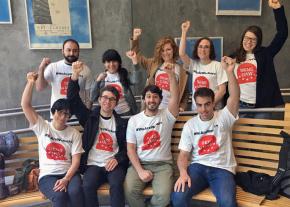New School, same old union-busting
reports on the efforts of student workers at the New School to form a union--and the attempts by this supposedly progressive private university to stop them.
AFTER YEARS of organizing in the face of opposition from administrators, thousands of teaching assistants (TAs), research assistants (RAs) and other student workers at The New School in New York City cast their votes on May 3 and 4 to choose the Student Employees at the New School (SENS-UAW, part of the United Auto Workers) as their official union.
The National Labor Relations Board (NLRB) impounded the students' ballots before they could be counted, after the university filed an appeal in an attempt to revoke the students' legal eligibility to form a union.
After polls closed on the evening of May 4, student workers occupied university President David Van Zandt's office to demand that the university release the ballots.
In an e-mail to student workers, union organizers castigated the university administration's tactics:
We know that there is overwhelming support for our union and are confident that the Labor Board will reject the University's baseless legal obstructions. Until they do our ballots will be locked away, uncounted. We call on the administration to drop these pointless charges, allow the votes to be counted, and let us proceed to bargaining our first union contract!

THE VOTE was the culmination of a multiyear campaign, in which the school refused to allow students to exercise their democratic will despite majority support for the union among student workers. Administrators instead deferred to the NLRB, which decided in July 2015 that a vote could not take place, citing a 2004 ruling that barred student workers at Brown University from unionizing.
However, in August 2016 a separate NLRB ruling in favor of student workers at Columbia University overturned the Brown decision, paving the way for unionization of student workers at other private universities, and prompting a reconsideration of the New School students' case. In December, the NLRB formally set the dates for an official vote at the New School in May.
It is December's decision allowing the vote to go forward which the university is now attempting to challenge. In its request to the NLRB for a review of the ruling, the university is attempting to argue that New School students are "temporary or casual" workers, and therefore legally barred from unionizing.
Meanwhile, the school administration has issued statements of apparent neutrality and feigned support for the union to the student body. Union organizer and MA student Mark Rafferty described this disingenuousness to the New School Free Press:
The New School administration continues to act completely nonchalant about this whole process, publicly pretending that it is on our side and there is no antagonism, while continuing to pay corporate lawyers tens of thousands of dollars to quietly stab our effort in the back using legal procedures that the students don't see. It is two-faced and shameful what the administration is doing.
THE NEW School brands itself as a progressive school committed to tackling issues of social justice, but its reliance on precariously employed adjunct faculty and its attempts to stifle labor organizing by its students and employees reveal a different reality.
As SENS-UAW notes on its website, "President Van Zandt was the 15th best-paid private college president in his first year on the job (at a middle-sized institution)" and the school has "one of the highest paid provosts in the country and one of the highest paid housing directors in the country."
Average tuition at the school is well over $40,000 per year, making it one of the country's most expensive private universities, and housing for students at the university's facilities in the Greenwich Village area costs up to $24,000 per school year for a single room (over $2,000 per month). Meanwhile, wages for certain types of student workers often barely exceed the New York state minimum of $11 an hour.
Their vulnerable economic position, combined with the ever-increasing costs of living and attending a university, means that RAs, TAs and other student workers are doubly deserving of the right to collective bargaining. As SENS-UAW notes on its website, student workers "compete annually for precarious jobs that lack a living wage, health benefits, and sick days, while often requiring unpaid overtime hours."
In their capacity as tuition-paying students who fund the university, student workers not only help pay their own salaries, but also those of faculty and the overpaid administrators who hold the university purse strings. In their position as workers, they perform crucial labor that allows the university to function, including research that helps New School to garner prestige.
With the increasing corporatization of the education system, featuring ever-higher tuition, bloated administrative salaries and ballooning student debt, organized resistance from both students and faculty will be key to rolling back the tide of neoliberal education "reform" that threatens to become even worse under Trump and his Education Secretary Betsy DeVos.
In the current moment, it is essential that students keep up the pressure and continue to fight for their own empowerment at The New School and other universities, public and private.


